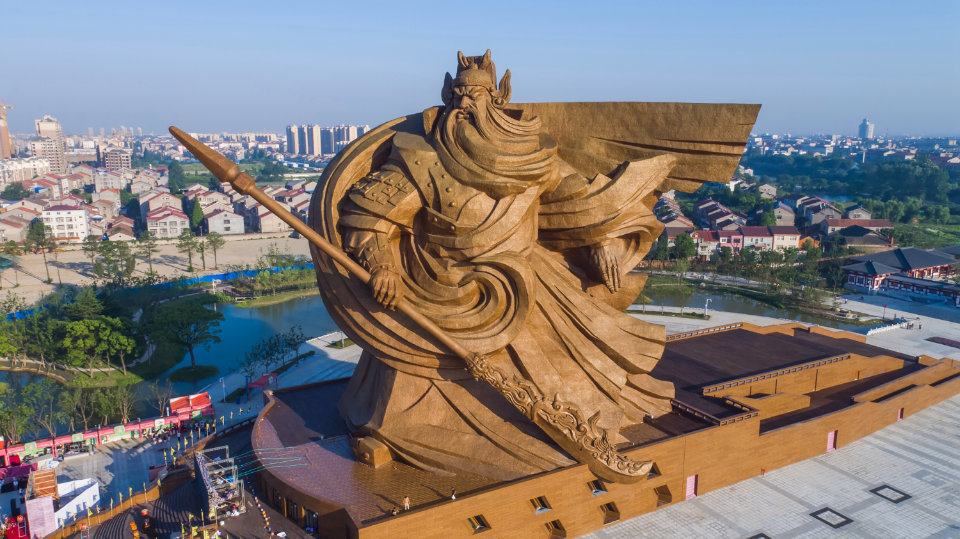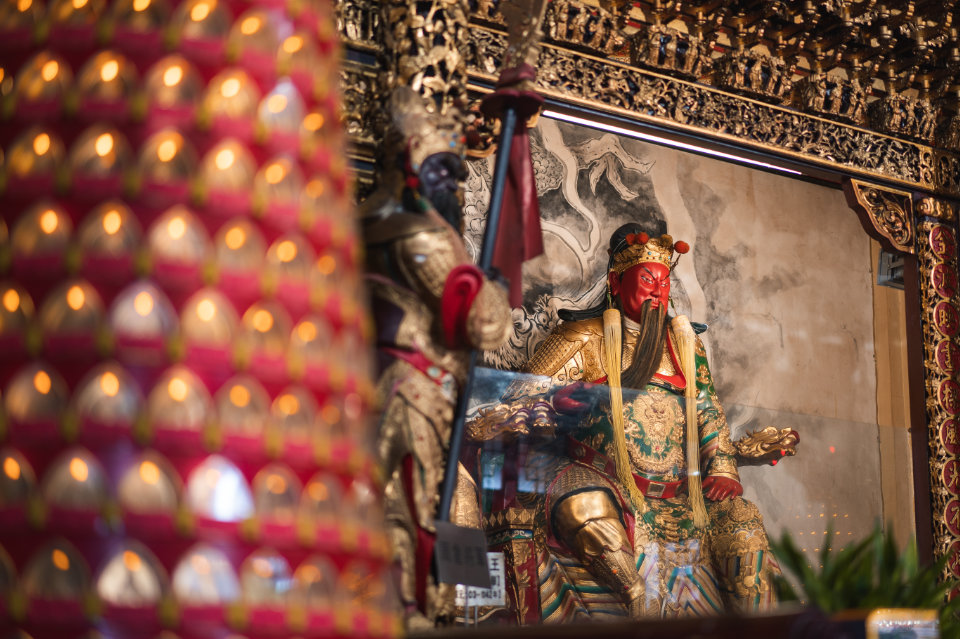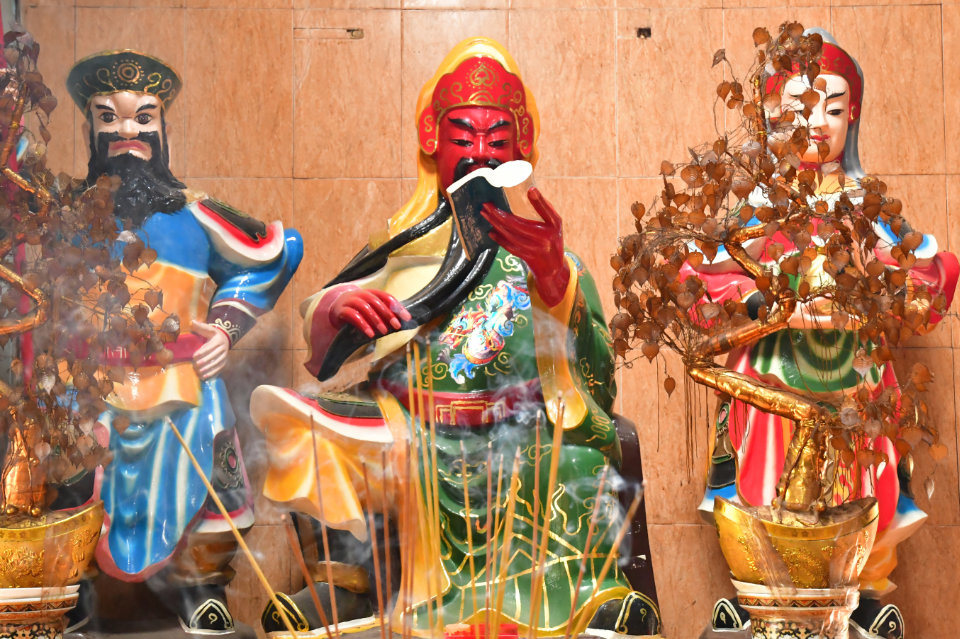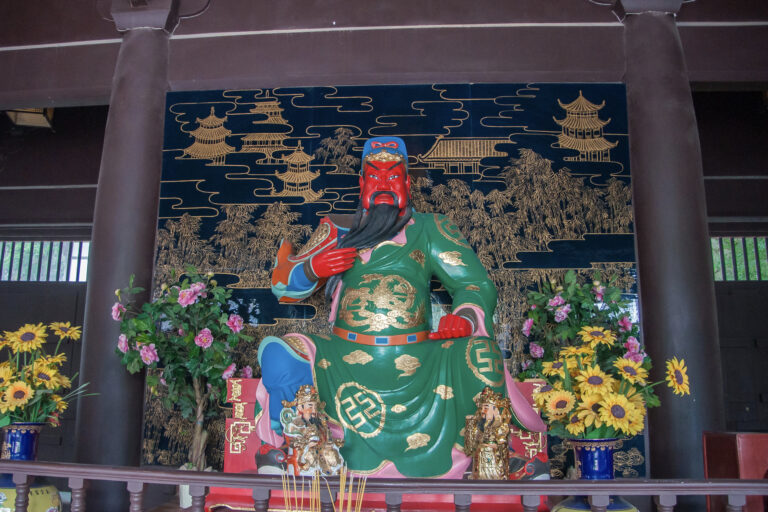Guan Gong (关公), also recognized as Guan Yu (关羽) or Lord Guan (关羽大人), is affectionately referred to as the “Gracious Lord” (仁爷) by Taiwanese devotees, embodying the persona of a “savior”.
The worship of Guan Gong has transcended geographical boundaries, finding devotees in Southeast Asia, Japan, Singapore, Malaysia, the Philippines, Chinese communities in Europe, America, and beyond.
Admired as the Martial God of Wealth (武财神) and an emblem of loyalty and righteousness, Guan Gong garners reverence from many merchants. But it’s natural to question why some seem to attract wealth by worshipping Guan Gong while others don’t.
Let’s delve into understanding the proper ways to worship Guan Gong to truly reap the benefits of this ancient practice.
Who is Guan Gong and Why Worship Him?
The act of worshipping Guan Gong (关公) carries a profound significance that is often linked to attracting wealth. However, it’s important to recognize that this practice isn’t taken lightly. Different cultural faiths hold varying perspectives on Guan Gong’s deification. For instance, while Buddhism reveres Guan Gong, it doesn’t prescribe specific prayers, praises, or ceremonial rules for his veneration.
On the other hand, Taoism regards him as the “Saintly Emperor Guan” (关圣帝君), popularly known as “Emperor Guan” (关帝), who is seen as one of the Four Marshals safeguarding Taoist law. Neither of these faiths sees Guan Gong primarily as a God of Wealth.
Transitioning from a famed general of the Shu Han kingdom to a deified, sanctified idol with temples spread throughout China, Guan Gong’s journey is a tale of continual glorification and sanctification by various societal groups since late feudal society in China.
Emperors across several dynasties held up Guan Yu (关羽), his human persona, as the epitome of loyalty and righteousness to inculcate faith in monarchical loyalty and patriotism. His status evolved from “Marquis to King, King to Emperor, Emperor to Saint, Saint to Heaven.”
Before worshipping Guan Gong, understanding his symbolism is crucial. So, what are we seeking when we pay homage to Guan Gong?
Folk worship of Guan Gong primarily revolves around wealth protection, dispelling evil and ensuring safety, and expressing loyalty and righteousness.
Table of Contents
Attracting and Guarding Wealth
Guan Gong, celebrated as the Martial God of Wealth, embodies integrity and honesty. Modern-day businessmen highly respect his personal strength and integrity, advocating the belief that profit should be based on righteousness.
Merchants worship Guan Gong with the conviction that their earned wealth is just, and in return, Guan Gong will protect their wealth.
Expelling Evil and Ensuring Safety
Traditionally, Guan Gong, equipped with his Green Dragon Crescent Blade (青龙偃月刀), alert eyes, and solemn face, has been considered a door god, providing protection to families from evil forces.
Loyalty and Righteousness
Guan Gong’s relationship with Liu Bei (刘备) and Zhang Fei (张飞), as immortalized in the Oath of the Peach Garden, is celebrated for its depiction of loyalty and integrity.
This paragon of loyalty and righteousness inspires many people in today’s society to worship Guan Gong as a means of expressing their own commitment to these values.

Prayers Procedures to Worship Guan Gong
If you want to worship Guan Gong, you must be cautious and adhere to the following:
- The bronze statue of Guan Gong should face the main door, at a distance of seven to nine meters; otherwise, the evil wind at the door is too strong. There should be walls on the left and right of Guan Gong, referred to as “Green Dragon on the left, White Tiger on the right”.
- The Guan Gong statue must lean against a wall, the reason being like having a supportive mountain.
- Avoid placing the Guan Gong statue facing toilets, kitchens, bedrooms, or other noisy places or against the wall of a toilet. There should be no sharp objects or objects blocking Guan Gong’s view where his eyes reach.
- As the saying goes, “Three feet above one’s head, there are gods watching.” The base of the Guan Gong statue should be level with your head.
- Offerings must be complete, including an incense burner, flower vase, gold ingots, offering tray, and candlestick. Fruits are offered every three days, including persimmons (symbolizing attracting wealth), grapes, apples, bananas, peaches, fragrant melons, Buddha’s hand citrons, pastries, candies, etc. Remember, Buddhists should not offer tomatoes (referring to Sakyamuni) or meat and alcohol, and Taoists should not offer plums (referring to Tai Shang Lao Jun).
- Incense should be offered to Guan Gong once in the morning and once in the evening, representing wholehearted devotion to the deity. If conditions don’t permit, one stick of incense in the morning will suffice. Normally, don’t burn three sticks of incense at once because this represents a desperate plea for help from the gods, so it is only allowed during major events.
- You must keep the area clean daily and ensure that the Guan Gong statue is not stained or dirty. Clean it once every week or half a month.
How to Pray to Guan Gong: A Step-by-Step Guide

This guide provides a respectful approach to praying to Guan Gong, covering preparation, prayer, and offering procedures.
Total time: 10 minutes
Prepare the Altar
Clean the altar space thoroughly.
Place an image or statue of Guan Gong on the altar.
Arrange three sticks of incense in an incense holder.
Prepare offerings like red candles, fruits, and Chinese tea.
Purify Yourself
Take a shower or wash your hands and face before approaching the altar.
Light the Candles and Incense
Light the red candles on the altar.
Light the three sticks of incense.
Present the Offerings
Place the food offerings on the altar.
Pour Chinese tea into a cup and set it on the altar.
Show Reverence
Kneel or bow in front of the altar.
Hold the incense sticks between your palms in a gesture of prayer.
Bow three times to show respect to Guan Gong.
State Your Intentions or Requests
Communicate your intentions or requests. Ask for protection, loyalty, or courage, whatever you seek from Guan Gong.
Place the Incense
Place the incense sticks into the incense holder on the altar.
Final Bows
Bow three times again to thank Guan Gong for his presence and blessings.
Close the Prayer
Take a few moments of silence, meditating or reflecting, before ending the prayer session.
Regular Worship Guan Gong
Maintain regular prayer sessions and keep the altar clean. Consistent reverence is key to a long-term connection with Guan Gong.
Worship Guan Gong For Studies
Students and exam takers worship Guan Gong In Confucianism, Guan Gong is known as the “Emperor Wen Heng” and is seen as the “God of Literature” by scholars. He is often seen holding the “Spring and Autumn Annals”.
He, along with the Emperor Wen Chang, Kuixing, Zhu Yi Shen Jun, and Lu Xianzu Master, are collectively referred to as the “Five Wen Chang”.
If you wish to pray to Guan Gong for a successful exam, consider offering the following:
- Oil (sounds like “Cheering”)
- Green onion (sounds like “Intelligence”)
- Turnip (sounds like “Good Fortune”)
- Garlic (sounds like “Counting”)
- Celery (sounds like “Hardworking”)
- Bamboo shoots (sounds like “Smooth”)
- Baozi, Zongzi (sounds like “Securing”)
- Osmanthus (sounds like “Noble”)
Worship Guan Gong For Peace
If you are praying to Guan Gong for peace and smooth sailing, prepare the offerings as usual, but for the Ascension Day or Guan Gong’s birthday, you can prepare more abundantly and completely.
Please consider offering the following:
- Cooked three sacrifices (Pork: Represents “smoothness in all matters, Chicken: In Taiwanese pronunciation, it sounds like “home”, symbolizing family reunion and Fish: Signifies surplus every year.)
- Fresh flowers
- Three cups of tea
- Three cups of wine
- Pastries
- Gold paper (Life gold, Harvest gold, Luck gold)
- The offerings should be positioned facing the god, with pork in the middle, a whole chicken on the left, and a whole fish on the right.
- The legs of the whole chicken should be folded back and tucked into its body, with the chicken’s head facing forward, but not directly towards the god.
- The tail of the fish should be directed towards the god.
Worship Guan Gong For Wealth
Guan Gong is also the “God of Wealth”, who can protect one’s career and work luck, and ensure prosperity. If you want to pray for wealth to Guan Gong, you need to be more careful in preparing the offerings.
There are some small taboos to be aware of. Please consider offering the following:
- Cooked three sacrifices
- Fresh flowers
- Three cups of tea
- Three cups of wine
- Pastries
- Gold paper (Life gold, Harvest gold, Luck gold)
- Five Roads God of Wealth gold paper
- Fruit: Bananas (representing “Attract”), Pears (representing “Profit”), Oranges (representing “Auspicious”) – five each (representing the Five Elements)
- Avoid some offerings if possible, such as apples (sounds like “poor”), walnut cakes, pineapple cakes, taro cakes and other cakes with the word “crisp” in their names, because they sound like “losing”.
Worship Guan Gong at Home
If you have Guan Gong enshrined in your home, you may consider placing a statue of a horse next to Guan Gong’s statue. This will make Guan Gong’s work “more efficient”, and the things you ask for will have a better chance of being achieved.
The “Guan Dao” is also a symbol of Guan Gong’s martial strength and evil dispelling power. For entrepreneurs and business people, Guan Dao can open up the market and attract business; for general believers, Guan Dao can guard the house, ward off evil spirits, and expel petty people, so don’t forget to put a Guan Dao next to Guan Gong, who is enshrined at home.
On Guan Gong’s Ascension Day and Guan Gong’s Birthday, temples that mainly worship Guan Gong often hold “Turtle Begging” blessing activities. Turtles are one of the four divine beasts in Chinese culture. The longevity turtles during turtle begging are often made with offerings like white rice, rice cakes, rice noodles, vermicelli, and red tortoise cakes, etc.
This not only thanks the Sacred Emperor Guan for his protection, but also prays for a bountiful harvest and peace in the coming year.
How to Position the Guan Gong Statue
There are specific things to note when positioning the statue of Guan Gong.Not only the underworld, but also merchants and businessmen revere Guan Gong as the God of Wealth, so the placement of Guan Gong in feng shui has quite a significant effect on people.
Here are some things to note when placing a Guan Gong statue:
- The direction of the Guan Gong statue should be placed facing north or west. It is best not to place it in a draughty location.
- If the Guan Gong statue is placed in the living room, remember not to place it in places like the bathroom or kitchen. If it is placed in the bedroom, choose a Guan Gong statue that has the effect of dispelling evil, not attracting wealth.
- Remember to offer two offerings, there should be sacrificial wine and incense. Offerings should be changed once a week, and a stick of incense should be lit each morning and evening.
- If placed in the living room, the ideal position is at the one o’clock direction, but be careful not to face the main door as it can lead to the loss of wealth and affect feng shui.
- There should be a wall behind the Guan Gong statue, just as if we have a mountain behind us. If a person doesn’t have a wall to lean on, they can fall with the wind, and the same applies when worshipping gods.

Specifics on Guan Gong Holding a Knife
There are also considerations when Guan Gong holds a knife. If the Guan Gong statue is pointing the knife upwards, it can be placed in the main hall to stabilize the house for peace.
If the knife is pointed downwards, it can be placed in the bedroom or some small places to dispel evil and scatter the negative energy in the room.
Placement of the Guan Gong Statue at Home
The process to worship Guan Gong doesn’t begin immediately after inviting the Guan Gong statue into your home.
- First, you need to choose an auspicious position. The direction must be accurately located with a compass, and you must not estimate it casually.
- If the Guan Gong statue brought home is small, it should be placed high to prevent it from being knocked over. The base of the Guan Gong statue should be level with an adult’s head, as the saying goes, “Three feet above one’s head, there are gods watching.”
- When placing the Guan Gong statue at home, do not put it in a pregnant woman’s room because the killing aura of Guan Gong is strong, and pregnant women cannot withstand the impact.
Placement of the Guan Gong Statue in the Company
Many companies also worship Guan Gong.
- In the company, it’s best to place Guan Gong in the lobby about 1/3 of the distance from the door, and it should be placed in the center.
- The height of the Guan Gong statue also matters. The case table should be about one meter, and the offerings and utensils placed on the case table are the same as those at home.
- The offerings should be doubled, and the incense should be the special kind for the God of Wealth. A wine cup should also be placed in front of the Guan Gong statue, with an agarwood cup being Guan Gong’s wine cup.
- The time to offer incense in the company every day should be before the start of business, and it is best for all employees to be present for the worship.
Taboos to Avoid When Worshipping the Guan Gong Statue
- The statue of Guan Gong should be worshiped alongside your ancestors. When you daily offer your prayers and devotions, even with utmost sincerity, the gods may think: while you are devout towards the divine, your ancestors are suffering in the underworld, what’s the point in worshiping gods? Therefore, when worshiping Guan Gong, make sure to place the ancestral tablets beneath the statue of Guan Gong. The level of your ancestors cannot be higher than that of the gods. It’s like if the gods live on the seventh floor, your ancestors must live on the sixth floor. Let your ancestors enjoy the incense offerings so that they can be transcended in the underworld. Once they are blessed, you will be blessed, and naturally, your wishes will be fulfilled.
- When worshiping Guan Gong, you should observe a vegetarian diet on the first and fifteenth of each lunar month.
- Do not allow ignorant individuals or outsiders to gossip or speak disrespectfully in front of the statue of Guan Gong. Any such people should be rebutted to maintain the dignity of the Guan Gong statue.
- Avoid uncivilized behaviors, actions, and language in front of the Guan Gong statue.
- Do not place any water-filled items like fish tanks or buckets underneath the Guan Gong statue. It’s best to keep the area under the statue clear.
- Do not point fingers or any other items at the Guan Gong statue.
- Avoid worshiping Guan Gong in pairs. The total number of Guan Gong statues should be odd.
- Zhao Gongming and Guan Gong, the two heavenly deities, cannot be worshiped in the same room.
- It’s forbidden to play mahjong, drink alcohol, or make noise near the Guan Gong statue. A quiet environment is necessary for worship, so that the gods can descend into their statues.
Worship Guan Gong: The Path to Fulfillment and Virtue
To worship Guan Gong (关公) is to embark on a path of virtue and fulfillment. This is not just about the rituals and offerings, but rather, it’s a spiritual journey steeped in bravery, loyalty, and righteousness.
When we choose to worship Guan Gong, we don’t merely seek guidance, wealth, and protection, we’re also embracing a steadfast beacon of unwavering loyalty.
As such, deepening our understanding and practice of how to worship Guan Gong becomes an enriching spiritual experience, offering more than just tangible rewards.
PS: Remember, whether you choose to worship Guan Gong, the Goddess of Mercy, the Tiger God , Tua Pek Kong, or the 4-Faced Buddha, if your heart is filled with loyalty and righteousness, the deity will shower you with blessings. Conversely, if you harbor any evil intentions, the deity will choose to ignore you.
When is Guan Gong’s birthday?
Guan Gong, also known as the Holy Emperor Lord Guan, has three key dates. The first is the 13th day of the first lunar month, known as his Ascension Day, which is when he achieved immortality. The second date is the 13th day of the fifth lunar month. This day holds two interpretations – it could be the birthday of Lord Guan, or it is considered Guan Gong’s Knife Grinding Festival, a day he prays for rain for the people. If it rains on this day, it’s a sign that Guan Gong has manifested his spirit, ensuring a bountiful crop. Most, however, recognize the third important date, the 24th day of the sixth lunar month, as the true birthday of Lord Guan.
What does the Green Dragon Crescent Blade symbolize in Guan Gong’s depiction?
The Green Dragon Crescent Blade that Guan Gong holds symbolizes his martial prowess and protective strength. It’s seen as a powerful tool to ward off evil spirits and ensure the safety of those who worship him.
How often should I pray to Guan Gong for good fortune?
Regular worship, such as daily or weekly prayers, is recommended when seeking to attract wealth and good fortune through Guan Gong. The key lies not in the frequency but in the sincerity and respect of the worship.
Are there any specific rituals or ceremonies during the Guan Gong festival?
Yes, Guan Gong’s birthday, celebrated on the 24th day of the sixth lunar month, (10th August in 2023) often involves specific rituals such as offering incense, food, and paper money. Some worshippers may also participate in traditional parades or temple ceremonies.
Can I place the Guan Gong statue in any direction in my house?
It’s preferable to place the Guan Gong statue facing the entrance of your home or business. This is believed to guard against negative energy and attract prosperity.
Is there a specific time to pray to Guan Gong?
While there’s no set time, mornings are generally considered auspicious for praying. This is believed to invite positive energy and blessings for the entire day.



